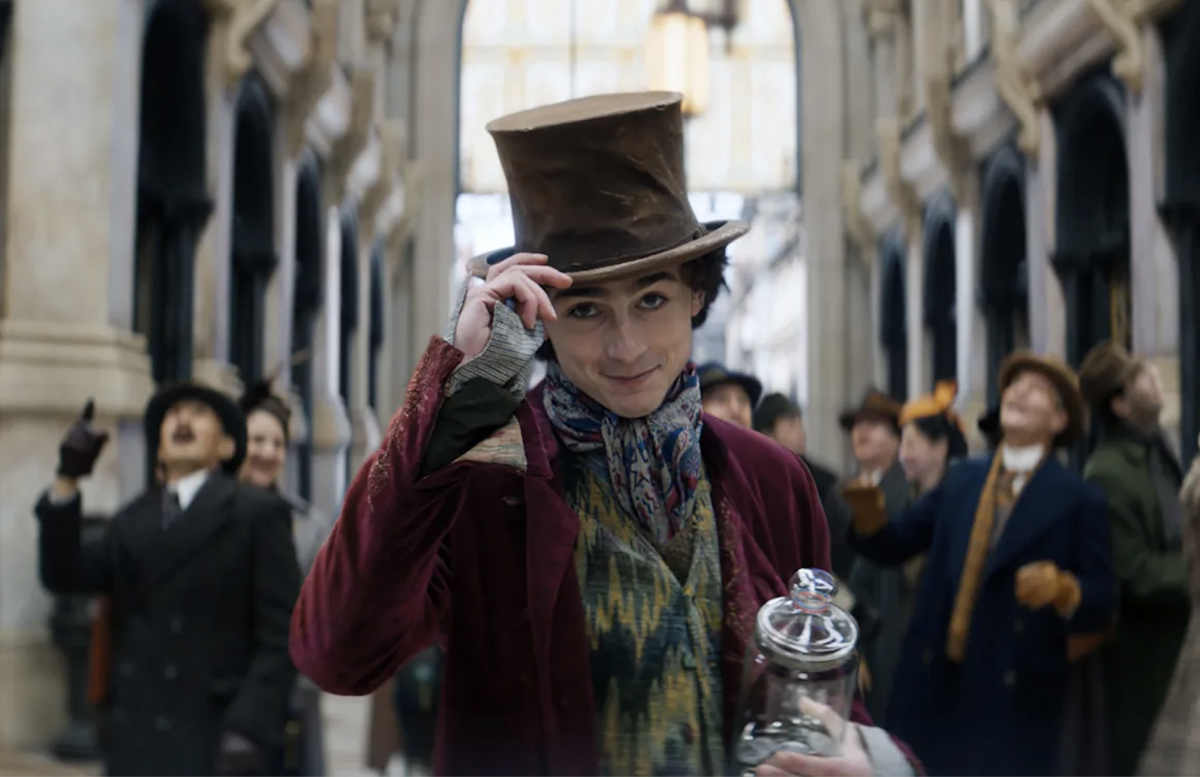If you’ve ever read any of the works of author Roald Dahl, you’d know they aren’t exactly cheerful. Many revolve around themes of madness, cruelty or evil, and “Charlie and the Chocolate Factory” is no exception. Part of what makes Dahl’s writing remarkable is the way he blends fantasy with reality or fabulous magic with dark undertones.
When actor Timothée Chalamet appeared on screen adorned in a knee-length magenta coat, striped trousers, and a brown top hat, my hopes were high. The very first shot of “Wonka,” a new musical rendition of the iconic character Willy Wonka, is Chalmet hanging from the mast of a ship with a gleam in his eye and a smile on his face. But as soon as he opened his mouth and began singing, I knew I was in for a rough ride.
Despite the promise of chocolatey nostalgia, “Wonka” leaves a bitter taste in your mouth, failing to capture any of the original character’s complexity or seriousness and presenting viewers with music and visuals that are each either tacky or downright hard on the senses.
In Dahl’s original novel, Willy Wonka is, for lack of a better term, mad. He’s traumatized by his upbringing and thus turns to chocolate, which becomes everything he has — so he locks himself in his factory for 10 years straight. When he abruptly reopens it and the events of the story take place, he is most certainly not all there, and at times his psychological state displays itself in rather unsettling ways. In the 2005 movie adaptation directed by Tim Burton, Willy Wonka is played by Johnny Depp, who depicts the character with just the right amount of eeriness and lunacy. But in “Wonka,” Chalamet’s portrayal is simple, peppy and entirely wrong.
It doesn’t help that an overwhelming majority of the music in the film is so lazily written as to be painful. One of the movie’s recurring jingles is the song “You’ve Never Had Chocolate Like This,” which contains this lyric: “Well, there’s chocolate, and there’s chocolate, only Wonka’s makes your confidence skyrockelet.” While an argument could be made for the song appealing to children with its goofiness and simplicity, I do struggle to understand how “Skyrockelet” is the best that the songwriters could come up with — and I can’t help but assume that if Dahl heard it, he’d be very disappointed.
As for the visuals, there’s nothing particularly appealing in any of the multi-million dollar sets or special effects. While Wonka’s factory and the streets of vintage London in the film are posh and flamboyant, there’s a certain flatness to them, like money replaced taste entirely during the design process. That being said, a few moments of the film are, to put it plainly, difficult to look at. Around halfway through the movie, Willy and his 14-year-old orphan friend Noodle must milk a giraffe in order to make a specific chocolate recipe. The scene is far too long and extremely unappetizing, even though the special effects on the giraffe look extremely expensive — which isn’t unrealistic given the movie’s $125 million budget.
Although “Wonka” may be appealing to children and an enjoyable experience for families, it is profoundly disappointing if you came for anything other than a mindless and easy watch. It betrays Dahl’s vision in many crucial ways, and it’s clear that the film was mostly if not completely a money grab. Instead of paying tribute to the story and character, the movie left me longing for the dark whimsy that made the original novel a timeless masterpiece.





















































